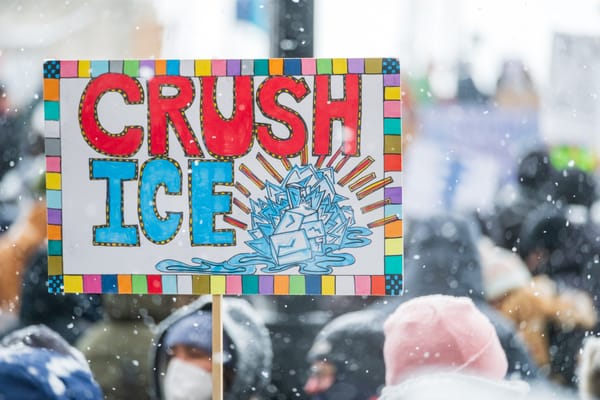What Elon Musk Did to the Government and What Comes Next
"The Trump administration has essentially been forced to take a partial retreat on Musk as a figure because he's too toxic," says Eric Blanc.


Elon Musk struck a pose like a Nazi, then took a chainsaw to the federal government, terrorizing federal workers, gutting life-saving aid programs, and shredding public services. Now, Musk claims to have returned his attention to his companies, after political blowback—fueled in no small part by the Tesla Takedown Movement—caused major financial losses for Tesla. So, where does that leave federal programs and the workers fighting to keep them alive? To unpack the fallout and assess where things stand, I spoke with professor and author Eric Blanc. Blanc writes the newsletter Labor Politics and is the author of We Are the Union: How Worker-to-Worker Organizing is Revitalizing Labor and Winning Big. He teaches labor studies at Rutgers University and serves as an organizer trainer for the Emergency Workplace Organizing Committee.
This interview has been lightly edited for length and clarity.
Kelly Hayes: A lot of people who are politically engaged are aware that of DOGE as a destructive force that has been involved in a lot of cuts and layoffs, but amid the barrage of harmful policies coming out of this administration, a lot of details get lost in the shuffle—and I think this is definitely true when it comes to the struggle between federal workers and the Trump administration. In March, Trump signed an executive order stripping more than 800,000 federal workers of their collective bargaining rights, claiming it was a matter of national security, while accusing “certain federal unions” of waging war on his agenda. The administration has also moved to reinstate Schedule F—rebranded as “Schedule Policy/Career”—a move that threatens job protections for tens of thousands of federal employees. We’ve also seen a push to slash the VA workforce by 15%, while the Department of Homeland Security has unilaterally scrapped its labor contract with TSA workers. Can you talk about what the current terrain looks like and what public sector workers are up against right now?
Eric Blanc: The current barrage of attacks initiated by Trump and Musk constitutes what’s probably the most serious attack ever on the public sector of the United States and potentially of the labor movement as a whole. The scale of what they're attempting to do and the damage that they've already done is more or less unprecedented, where you're just trying to use a sledgehammer against the entire federal workforce and some of the biggest unions in the country.
And we don't know all of the damage that's already been done. This is one of these stories that the full repercussions of exactly all of the cuts that they've made and are attempting to make, we're going to be feeling these impacts for decades. But what we can say is that they've successfully terrorized millions of workers. There's over two million federal workers in this country. Tens of thousands of them have been laid off. Hundreds of thousands are facing potential layoff, and whether they end up getting laid off will depend to a large extent on the extent of the pushback in the streets, and also some of the legal battles that remain very up in the air. But no matter what happens, even in the best case scenario that we're able to stop the worst of the looming cuts, what we can say is that the capacity of federal services has been dramatically undercut.
Just to give one example, senior citizens are already facing far longer wait times for getting their social security claims processed. And so this is just a service that almost everybody depends on, and the cuts that have already been implemented, together with the general chaos that the administration has imposed on the federal workforce has already started impacting not just the federal workers, but the broader American public.
And I think that's one of the things that gets lost a bit in some of the conversations when we talk about the attacks on federal workers. It's not just that we're talking about millions of workers who are being forced to work under the gun right now, and who tomorrow don't know if they're going to have a job, and who's collective bargaining rights have been stripped away, or who are fighting not to lose those rights. These attacks on federal workers are impacting almost every American. So social security is one obvious example, but the attacks on basic food and health and environmental regulations, those impact everyone. Corporations are going to try to get away with murder like they did in the pre-regulation era because whatever they can do to make a profit, well, they'll do it. If it means polluting your water, if it means polluting the air, of course they're going to try to do that if there's no regulations to stop them. And so it's a very dangerous terrain we're on.
And the federal workforce, I would say that the overall mood is still of chaos and terror, frankly. There has been a growing pushback. So, I think that's hopeful and we can talk about that.
Kelly Hayes: In February, you wrote a post on X that stated, “If Musk illegally busts federal employee unions with little public outcry or broad labor fightback, every employer will take note [and] try to copycat. Remember: Reagan’s 1981 firing of federal PATCO air traffic controllers sparked an employer offensive in all industries vs all unions.” Can you talk about that historical parallel and how this administration’s attacks on federal workers could affect unions and workers more broadly?
Eric Blanc: It's worth noting that the 1981 PATCO firings of striking air traffic controllers, as you mentioned, were also federal workers. So it is significant that in both cases, the tip of the spear, as it were, of the bosses' offensive has been against federal workers. In part, that's because these are some of the last bastions of union strength in the country. In the private sector, you have only 6% of the workforce in unions. And so when you talk about undermining the strength of organized labor, well, you have to go after the public sector, where density is much higher.
In 1981, Reagan fired over 10,000 striking air traffic controllers. And what that did is it sent a signal to the entire employer class that they could go on the offensive against all unions and frankly against all workers.
And we had over the next decade, and frankly in many ways up to the present, was employers reneging on the types of stable protected jobs that had been more of the norm, at least for more numbers of workers in the post-war period, the types of jobs that still, frankly you have in some parts of the federal sector where you can have a decent livelihood and you don't have to be worried about getting fired at will every day like you do in the private sector. Those types of jobs became fewer and farther between because the bosses after 1981 started unilaterally busting unions. They started unilaterally breaking labor law in a way that just hadn't been seen until then. What you have now is a world in which bosses understand that the costs of breaking labor law are minimal, so they routinely do whatever they want, knowing that they're just going to get a slap on the wrist, and that practice continues up through the present.
The danger with the Trump attacks on the federal sector is that this could further ratchet up an employer offensive where it's not just that they want to get rid of unions, which at this point in the private sector they already have largely succeeded in doing, but that they can take a page from Musk's playbook. And what Musk has done at Twitter, what he's done at Tesla, and what he’s tried to do in the federal sector, is to not just bust unions, but to essentially cut the workforce in half and make everybody else work double for less or the same pay, and with no security, and to terrorize workers into submitting to arbitrary dictates.
And this is like the fantasy of every employer. Every employer would love to be able to do that, whether they have a union or not. You can read the business press, and so many of these employers are complaining about workers' leverage during the early pandemic, when workers felt like they could make demands upon management, that they could try to interfere in internal processes, and just get another job if they didn't like this one. So with the Great Resignation, and all of that pushback and tumult, employers have really felt like their prerogatives of control have been undermined over the last few years.
And if there's not a huge amount of backlash, even higher than we've already seen against the terrorization of the federal workforce, other employers are going to assess that they can try to get away with the Musk playbook in their companies as well. And we're already seeing that to a certain extent in the tech sector, but there's no reason that we shouldn't expect other companies to try to move down that same road, unless there's enough of a public outcry that they're scared of getting the boot like Elon Musk is getting the boot right now.
So it's a bit of an open question whether they're going to try it, and that's why the stakes of what is happening around DOGE and Elon Musk are pretty high, I think, for everybody, and not just the federal workforce.
Kelly Hayes: In what ways have federal employees resisted Trump's actions and what lessons can the rest of us take from these actions?
Eric Blanc: I think the extent of bottom-up resistance in the federal workforce has been amazing, given that the unions themselves in these sectors are very risk-averse and have very little organizing tradition, and frankly, up through the present have mostly focused on litigation. And so the resistance against Trump has mostly had to come from below.
The leading force for fighting back in the federal sector and for connecting with the community has been a new organization called the Federal Unionist Network, which is a rank and file-led organization that unites federal workers across all of the different agencies and unions. And the FUN, which is its acronym, has organized various days of action. It was integral to getting tens of thousands of federal workers out on the streets on April 5th for the big Hands Off actions. The FUN actively took the lead in convincing the official federal unions, the established unions and the labor movement as a whole, the AFL-CIO and other national unions to mobilize for April 5th because a lot of them were not, until the very last minute, even planning on letting their members and others know about these actions.
And so the FUN took the lead on saying, look, we are not going to win this alone. We're not going to win this just with workers filing lawsuits in different agencies, we're not even going to win it just through workers' agency by agency trying to push back. We need to have a broad united pushback of federal workers working in conjunction with the community, because this is one of the lessons of labor movements in general, but particularly in the public sectors—the way you win is by leveraging public support. Going on strike in the public sector doesn't have the same weight on its own. You can't halt profits. So, really what striking does is it creates a public crisis and outpouring that can be directed against managers and politicians. And the leverage therefore of federal workers is overwhelmingly how do you get average Americans, who aren't necessarily in unions, certainly not in federal unions, to understand that the battle of federal workers to protect their jobs and their services impacts every working class American, middle class American.
So, from social security to these environmental regulations to just basic things like can you fly in safely to Newark Airport, that depends on a well-funded unionized workforce in the federal sector. And that's the message I think that the FUN has been getting out there, that the way we protect the services of the broad majority of Americans is through defending unions. So that's one thing connecting unions to the broader public service fight back.
And then I just think the other major point is we can't rely on the courts. The courts may have partially slowed some of the worst of Trump and Musk's attacks, but it's crazy to think that the Supreme Court is ultimately going to be a defender of democracy, public services, and these workers—and we've already seen a lot of crucial litigation go the wrong way. So, for instance, the executive order that Trump imposed taking away union rights got cleared just a few weeks ago by the courts, it's been allowed to be implemented.
Within and outside the labor movement, I think there's a sort of a broader overestimation of how much of a barrier the courts are going to be against Trump and that unless we can make it clear that Americans as a whole are ready to organize by the tens of millions, potentially through disruptive actions and to raise the political costs for Republicans and any politicians that go along with these types of attacks, unless we can have that type of mass mobilization, I don't think we are going to be able to stop Trumpism. It's conceivable you could win an election, if those are allowed in two years and in 2028, but to actually stop the movement behind that and to undermine the roots of MAGA, you need to have a mass movement that can provide a compelling alternative vision for what this country should be, which is a anti-billionaire sort of pro-democracy, pro-social justice vision.
Kelly Hayes: There’s been some debate over whether Elon Musk’s departure from the Trump administration really matters, since he remains an influential figure and his loyalists are still active inside DOGE. Can you talk about what’s going on with Musk right now and what that means for workers, especially those still facing fallout from his leadership at DOGE?
Eric Blanc: I think sometimes on the left, we're not so good at claiming our wins, and this is an important win, and I think it's important to own it as a win. Of course, it's true that the battle is far from over against Trumpism or against DOGE, but the fact that Musk has been pushed out is very clearly a repudiation from below of his policies. That’s crucial for two reasons. One is it will slow down some of the wrecking ball operation of DOGE because Musk was driving it at such an insane speed, and without their figurehead, we are already seeing a shift in the tempo of what DOGE is doing.
And that's very important because so much of the difficulty of organizing in the first weeks and months of this new administration was just the rapidity of Musk’s attacks. Everything was happening so fast; every day, there was one attack after another. And it didn't give our side and workers, frankly, the ability to start organizing, because it was just an endless barrage of these attacks. And so if you can slow that down, it gives you more space to build a fight back that can win. So that's part of it.
And then the second part of this is about what this means on the broader public opinion, political front. What they're doing at DOGE was never about government efficiency. We know this. It was always about imposing their control over the federal workforce, first and foremost. And then, secondly, it was about finding a scapegoat for the real anxieties of working-class Americans. Something that MAGA probably understands better than the Democratic Party is that people are hurting and they're looking for somebody to blame. And when you are an administration of and for the richest men, or if you are the richest man on the planet like Elon Musk, well, then obviously you're not going to go after the billionaires, and that requires you ideologically to find other scapegoats.
So, immigrants have been and remain the main scapegoat, alongside trans people, but in the last few months, they’ve tried to add this additional scapegoat, which is that government bloat and the federal bureaucrats are somehow at the root of most people's problems. And Musk has been broadly reputed. Everybody understands he's unpopular, and he himself has said he might get out of politics because people are too mean. There's no world in which even Elon Musk has really been able to paint this as something other than what it is. There's not really any ambiguity about what's going on here. That signals something really important, which is that Americans actually like public services. They don't want the government to terrorize unions, and they don't want the richest people on earth unilaterally dictating government policy. And so that has been proven to be the case. So much so that the Trump administration has essentially been forced to take a partial retreat on Musk as a figure because he's too toxic.
Obviously, the battle continues. DOGE is not gone. The administration is still planning on imposing mass layoffs through Reductions In Force (RIFs). So, the big battle over the coming months that readers should keep their eyes on is that we need to do everything possible to stop these mass layoffs that are looming, not just at Veterans Affairs or Social Security, but all across the federal sector. If these are implemented, that will be far worse than anything we've seen so far, because it will cement a decimation of public services. But we're in a better position to win that battle now that Musk has been sidelined.
Kelly Hayes: I think part of the hesitancy, for some leftists and organizers, to acknowledge the full extent of Musk’s injury here is that they don’t want people to stop organizing against him or punishing him for his actions. And I think this is a situation where we really need to hold multiple truths. Researchers estimate that over 96,000 adults and 200,000 children have already died because Musk put USAID “through the woodchipper.” He struck a pose like a Nazi on an international stage, and then got to work making cuts that would kill people en masse. Millions of people are likely going to die because of his actions. We’re talking about a man who should never know any peace, even if he’s suffering from a temporary or permanent loss of influence in the White House.
Republicans in Congress are also working to codify some of the DOGE cuts, which would further lock in and legitimize some of the damage Musk can’t be let off the hook for these ongoing impacts, and people should continue to make him miserable—as punishment, as a deterrent to his potential return, and as a deterrent to other ultra wealthy men who might follow in his footsteps. He should be met with scorn wherever he goes, and I think that’s a political project that should be maintained. But it would only take a handful of Republican defectors to derail congressional efforts to codify the DOGE cuts, and we need to keep our eyes on that, too. Which Republicans are vulnerable on this? How can they be pressured? Who among them can be made to pay a political cost for doing the wrong thing?
I also want us to remember that this is an oligarchical administration and that Musk isn’t the only major tech player we need to worry about. This administration is increasingly turning to Palantir, a company founded by Peter Thiel, to create the kind of surveillance apparatus that DOGE workers (some of whom used to work for Palantir) have been talking about, by merging government databases. We’re talking about the creation of a digital panopticon, and the administration doesn’t need Musk or even DOGE to do it.
It’s also noteworthy that Musk was furious about his company xAI being excluded from a project to build what’s being called the “Stargate AI campus” in the United Arab Emirates. That deal, brokered by the administration, includes Oracle, Nvidia, Cisco, and Open AI—which is run by Musk’s enemy and rival Sam Altman—and Musk threw a fit about his company not being included. But the deal wasn’t changed. A few months ago, I just can’t imagine the story going down that way. This was Musk’s government, as much as it was Trump’s, and that’s not true anymore.
So, I think we should celebrate the fact that Musk has taken a major hit, and that everyday people and workers have inflicted that injury through advocacy and protest, and also keep swinging at him, while remembering that the fight is bigger than one man, even if he is the world’s richest man.
Eric Blanc: I think we’re so used to losing and we sometimes feel like the other side is all powerful, but it turns out we actually have a lot of power and we need to be able to leverage the divisions that exist up above in order to go on the offensive and win our demands. So I think that what’s happening with Musk is proof that we're at least moving in the right direction.
Organizing My Thoughts is a reader-supported newsletter. If you appreciate my work, please consider becoming a free or paid subscriber today. There are no paywalls for the essays, reports, interviews, and excerpts published here. However, I could not do this work without the support of readers like you, so if you are able to contribute financially, I would greatly appreciate your help.




